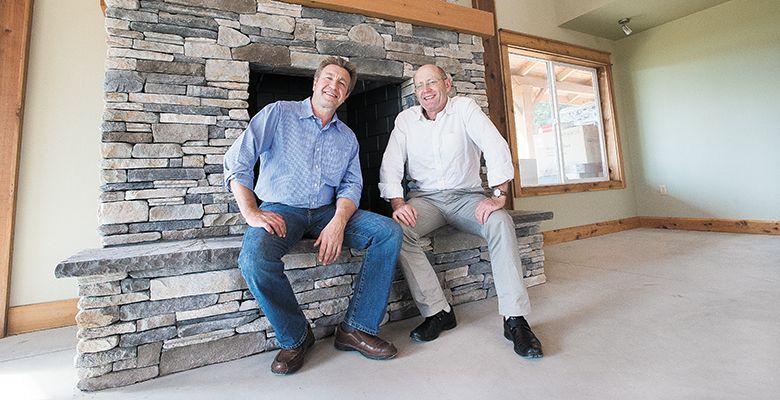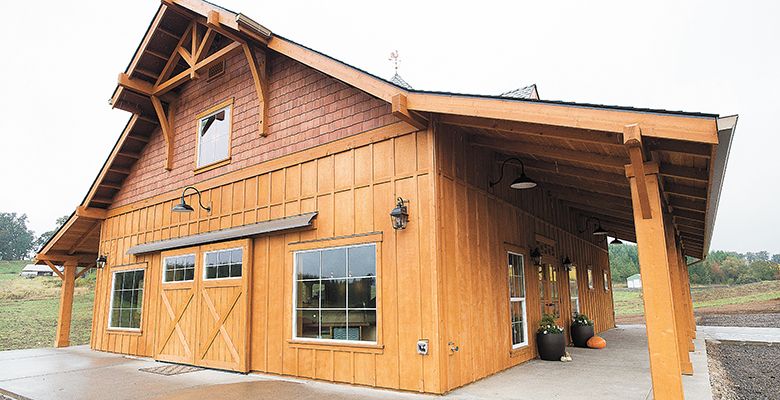Pour l’Amour du Pinot
Winemaker builds brand on foundation of Burgundian roots
Like so many before him, Bruno Corneaux traveled from afar to Oregon to fulfill a dream, a Pinot-soaked dream. When a man with Burgundy in his lineage and Pinot Noir in his heart searches for a new place to “put down roots,” where is he to go? A look at regions producing Pinot Noir on a meaningful scale and the choices are limited.
Corneaux is a fourth-generation Burgundian vintner. Winegrapes still grow on the family’s land near Beaune. His grandfather was one of the founders of the largest cooperative in the area.
Comparisons of Burgundy and Oregon are not new. Willamette Valley borrowed classic Burgundian grapes because of similarities in terroir, a word also borrowed from the French. The differences, however, are most intriguing to Corneaux.
This year, the Willamette Valley is celebrating its golden anniversary of Pinot Noir — 50 years ago, the first plants were established by David Lett of The Eyrie Vineyards. An important milestone, but everything is relative, especially to someone from the Old World. From Corneaux’s perspective, Oregon’s industry has only just begun, a fact he appreciates. He likes this fact.
“In Burgundy, I could catch the train and ride along, or I could help lay the tracks here in the Willamette Valley,” Corneaux said.
A desire to be a part of the “burgeoning of Pinot Noir in Oregon” and the overall spirit in the Willamette Valley inspired the Burgundian to move west.
“There is no downside to my choice to make wine in Oregon,” Corneaux said. “The people in this industry, both consumers and winemakers, share such a great enthusiasm.”
The collaborative nature of Oregon’s winemakers also stands out to him.
“[Oregon] is different than Burgundy,” he noted. “Here, if your neighbor succeeds, people realize that is good for everyone.”
Corneaux is already well-entrenched in the local winemaking community. It was a connection to Domaine Drouhin that first planted the Oregon seed in his mind in 1996. After a few years working in Washington state, he found a position as vineyard manager and winemaker for Soléna Estate in 2009. He is currently the director of winemaking for NW Wine Company, which produces several outside labels, and has ventured on his own, too.
Introducing Domaine Divio.
Working with fruit from various AVAs within the Willamette Valley, Corneaux knew where he wanted to plant: Ribbon Ridge.
“[This AVA] is an exciting little jewel,” he commented. “The marine sedimentary soils give Pinot Noir an earthiness that reminds me of Burgundy.”
Once again, the differences abound between the Willamette Valley and Burgundy. Acquiring land here is such a distinct experience from Corneaux’s homeland, where inheritance laws dictate that assets be divided equally among heirs, and marriages are made to unite vineyard land. It is even common to own a few rows here and there.
Corneaux wanted to create his own top quality estate. Oregon’s relatively new industry allows him this luxury, to establish a vineyard in what he calls “the Pinot Noir promised land.” With the help and investment of a longtime Burgundian friend, André Weil, Domaine Divio was born —Divio is the Roman name for Dijon.
Last year, Corneaux planted six acres of Pinot Noir, with plans to establish six or seven more with a few rows of Chardonnay. On the 23-acre property sits the relaxed tasting room for Domaine Divio; Corneaux designed it himself.
“We wanted to fit in with the natural landscape of the countryside and create a space where people feel at home,” he added.
The building is cedar in its natural rough form. Sliding double barn doors open to a patio where picnic tables provide guests a casual place to enjoy the view. Inside, a wood-burning fireplace with stone surround creates a cozy feel. Above, a vaulted knotty wooden ceiling, exposed beams and swirled light fixtures — reminiscent of wine swirling in a glass — add character. Reminiscent of old-fashioned wooden file cabinets, the custom-made bar is, in itself, a conversation starter; behind the bar, Corneaux looks forward to chatting with customers — his warm personality and ready grin make him an ideal host.
“I want to connect with the visitors,” he said. “It is a better wine experience for both me and the guests if we can spend time together.”
Corneaux finds the stories behind the wines his favorite conversations, including how the grapes are raised.
Domaine Divio is farmed Biodynamically — not surprising considering his French heritage — but his family doesn’t farm this way in France, in part, because of the amount of labor required. Instead, he became a Biodynamic believer in French Polynesia.
Hired to establish the first winegrape vineyard in Tahiti, Corneaux had his work cut out for him. He tested 40 varietals in a climate with no winter. Two harvests per year meant growing cycles had to be forced. He noticed some days he planted and the result was great; other days, awful. He discovered these fluctuations aligned with the Biodynamic calendar, which divides vineyard activities into root, fruit, flower and leaf days. With no measurable temperature differences, no seasonal changes, and even negligible variations in the tide, he was left only to be guided by the stars and moon. In the end, the results could not be ignored.
Until his vineyard is old enough to harvest — he planted his first six acres last November — Corneaux purchases and blends fruit from various AVAs: Dundee Hills, Eola-Amity Hills, Yamhill-Carlton and Chehalem Mountains. His current offerings include two 2012 Pinot Noirs, a 2013 Pinot Noir and a 2014 Chardonnay. He intends to work strictly with the Burgundian varietals, producing wines with a “focus on acidity.”
His background informs his winemaking, which he jokingly calls “lazy” and then self-corrects to say he does not intervene unnecessarily, a true Burgundian — and now Oregonian — approach.
Domaine Divio, located at 16435 N.E. Lewis Rogers Lane, Newberg, will be open weekends and by appointment beginning early November. A grand opening event will be held the weekend before Thanksgiving. For more information, visit www.domainedivio.com.
Jade Helm is the primary author of Tasting Pour, a blog about wine, cocktails and food. Her expertise is evidenced by credentials from the Society of Wine Educators (Certified Specialist in Wine) and the Wine and Spirits Education Trust (Diploma in Wine and Spirits) and from the Court of Master Sommeliers (Certified Sommelier).














